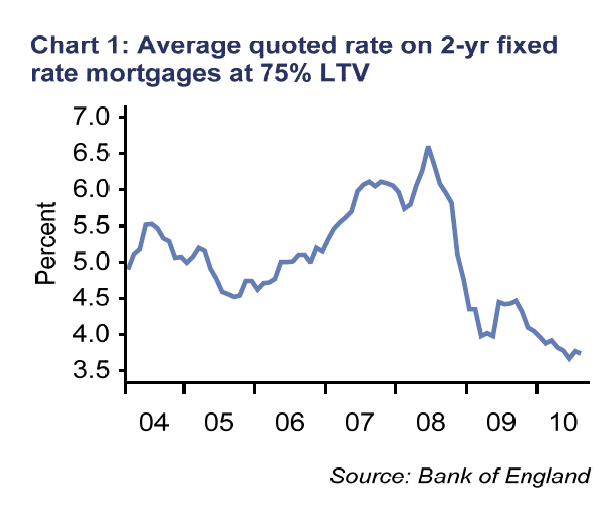UK House Prices Downtrend Continues in October, Market Waits for Further QE
Housing-Market / UK Housing Nov 05, 2010 - 04:10 AM GMTBy: Nationwide
 House prices fell by 0.7% in October
House prices fell by 0.7% in October
- Three month rate of decline accelerates to 1.5%
- Further quantitative easing could boost the housing market
| Headlines | October 2010 | September 2010 |
|---|---|---|
| Monthly index* | 327.9 | 330.3 |
| Monthly change* | -0.7% | 0.0% |
| Annual change | 1.4% | 3.1% |
| Average price | £164,381 | £166,757 |
Commenting on the figures Martin Gahbauer, Nationwide's Chief Economist, said:
“October saw a continuation of the modest downward trend in house prices that began at the start of the summer. The average price of a typical UK property edged down by a seasonally adjusted 0.7% month-on-month in October. The three month on three month rate of change – a smoother indicator of the recent price trend – fell to -1.5% in October from -1.0 % in September. This is the largest decline over three months since April 2009, but is still well below the 5-6% rates of decline on the three month measure seen during the second half of 2008. The annual rate of change – which compares the current level of house prices against their level twelve months ago – declined from +3.1% in September to +1.4% in October. If the recent trend in house prices were to continue through November and December, the annual rate of house price inflation would drop to between 0% and -1% by the end of 2010. This would compare to a rate of +5.9% at the end of 2009."
How might further quantitative easing impact the housing market?
“The October minutes of the Monetary Policy Committee (MPC) meeting pointed to increased debate about whether or not it would be appropriate to initiate a second round of quantitative easing in the near future. Should the MPC decide to follow such a course of action, it is worth considering what impact it might have on housing market activity and prices.
“The first round of quantitative easing was initiated in March 2009, roughly coinciding with the trough in house prices following the severe downturn that began in late 2007. Although quantitative easing was probably not as important a factor in the subsequent house price rebound as the reduction in interest rates to near zero, it probably did play some role and there are a number of ways in which it could be expected to influence the property market.
“Firstly, quantitative easing has the effect of lowering the cost of government borrowing. Since the cost of fixed rate mortgages is closely linked to the interest rates on government bonds, the policy would contribute to lowering the cost of borrowing for homebuyers taking out new mortgages. The cost of 2-year fixed rate mortgages has in fact already come down noticeably over the last year, partly as a result of markets anticipating additional quantitative easing by the Bank of England (chart 1).

“Secondly, quantitative easing is implemented by purchasing government bonds from investors with newly created money. To the extent that this money is then reinvested in bank debt or mortgage-backed securities, it could have the effect of improving wholesale funding conditions for UK banks and making it easier to refinance the large amount of governmentbacked funding expiring over the next several years.
“Finally, additional quantitative easing could have the impact of raising inflation expectations, which in turn could encourage investors to divert more money from cash holdings into property-related assets.
“The strength of these effects is very difficult to quantify, and it is impossible to say at this stage whether additional quantitative easing would fully offset the various headwinds currently facing the housing market, including the impact of the measures announced in the Comprehensive Spending Review. On balance, however, it is reasonable to expect that a resumption of quantitative easing would provide some offsetting support to the housing market.”
| Martin Gahbauer Chief Economist Tel: 01793 655434 fionnuala.earley@nationwide.co.uk |
Roy Beale Media Relations Officer Tel: 01793 655689 roy.beale@nationwide.co.uk |
Notes: Indices and average prices are produced using Nationwide's updated mix adjusted House Price Methodology which was introduced with effect from the first quarter of 1995. Price indices are seasonally adjusted using the US Bureau of the Census X12 method. Currently the calculations are based on a monthly data series starting from January 1991. Figures are recalculated each month which may result in revisions to historical data. The Nationwide Monthly House Price Index is prepared from information which we believe is collated with care, but no representation is made as to its accuracy or completeness. We reserve the right to vary our methodology and to edit or discontinue the whole or any part of the Index at any time, for regulatory or other reasons. Persons seeking to place reliance on the Index for their own or third party commercial purposes do so entirely at their own risk. All changes are nominal and do not allow for inflation. More information on the house price index methodology along with time series data and archives of housing research can be found at www.nationwide.co.uk/hpi
Nationwide Archive |
© 2005-2022 http://www.MarketOracle.co.uk - The Market Oracle is a FREE Daily Financial Markets Analysis & Forecasting online publication.



